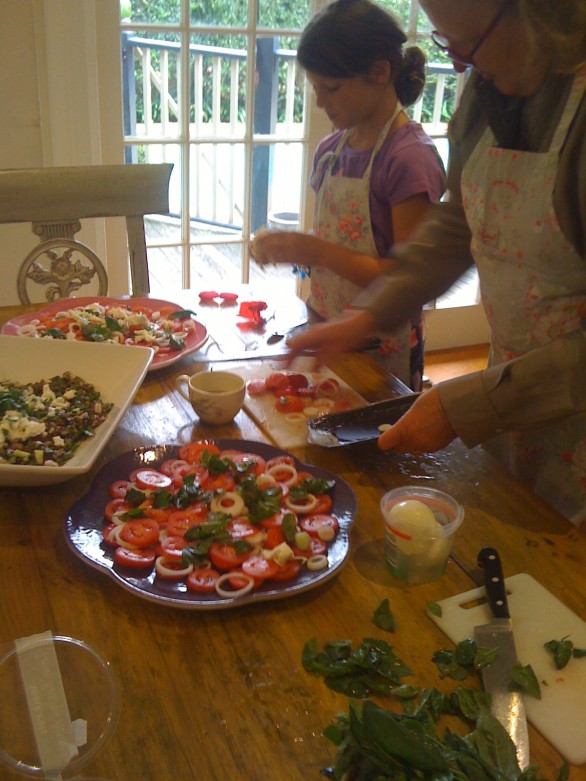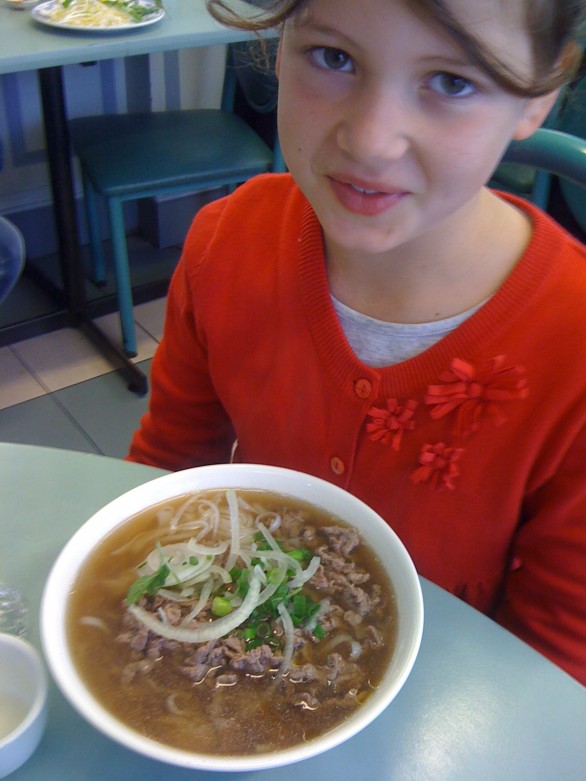I credit my mother for instilling in me a love of food and a passion for experimentation in the kitchen. She is a great cook and always insisted that we try the dishes she prepared at least three times (big mouthfuls, not just nibbles). On the whole it was a positive experience as she had the knack of making the new tastes tempting, exotic -mysterious even. She always involved us in the process of cooking, explaining as we went, where the food came from, why the flavours would complement each other and how, on the whole fresh is always best. So much so that in the end we couldn’t help but want to try whatever it was she put in front of us. Although I do remember a gruesome experience with Pickled Pork and a further disaster tasting Tripe in Tomato Sauce (both of which I now adore).

Preparing lunch with Grandma
So to my mind, Mum was right. Involvement, persistence and creativity are key when attempting to expand your children’s palates. The upside of doing so? Your children will quickly learn about the depth and breadth of the world’s cuisines – which can lead to lovely conversations about cultural diversity and tolerance and love of difference. They will also garner a knowledge of agriculture, food production and sources and the need to think sustainably whenever possible. It will almost certainly lead them to being comfortable in the kitchen.
My tips and ideas for introducing new flavours and cuisines?
- Go slowly but persistence is key.
- If you’re not a confident cook, consider a couple of basic cooking classes with your children.
- If it doesn’t work first time, that’s cool. Give it a break and try again another time.
- Make it fun. Invite their friends over and encourage them to cook together.
- Use garnishes as a way of making the meals look appealing and quirky. We use edible flowers a lot.
- Chat about the ingredients. How many are the same? How many are different?
- Consider dressing up in the national costume of the country of the chosen cuisine. Don a kilt and make a Haggis! Or a find a kimono and give Sushi a go.
- Get out the atlas while cooking and chat about which country the recipe hails from and how it differs from your own.
- Involve your children as much as possible at every stage of the process.
- Encourage talk about the senses – smell, taste, touch, sight and sound – how are they different? How are they the same?
- Have them devise their own recipes – their creativity will amaze you. You could suggest they invent their own country and an accompanying cuisine.
- Every now and then treat them to a night out at the local Thai, Indian, Vietnamese, Japanese, Korean, Italian, Greek, Chinese etc, etc.
- But most of all, enjoy the process. If it doesn’t feel right or becomes stressful, cook their favourite meal (in my home that’s schnitzel and mashed spuds *sigh*) and tackle the world’s cuisines another day.
Last year Mum visited the stunning Ginja Cooking School on the beach front in Phuket, Thailand. I was incredibly envious and had to make do with her gift of a small but inspirational recipe book. My children and I have since been working our way through it.
Thai flavours can be challenging for children (not used to having them on a regular basis). Cries of “it’s too spicy” or “there are sticks and leaves in my dinner” were commonplace when we first started out. But the thrill of being let loose with a mortar and pestle, pounding along with chopping and peeling, and the planting, growing and harvesting of our own asian herbs quickly won them over.

Tasting Vietnamese Pho for the first time
Over at our blog dedicated to food, No Fuss Food, you’ll find the latest meal the kids and I prepared. We were inspired to give it a go after finding that the lemongrass in our garden had gone ballistic. It’s the delicious and very popular Thai dish – Tom Yum Goong. It’s much easier than it might appear. We promise.
I think you’re right. A few weeks ago my four year old did her own version of cakes into which she put some dubious ingredients. I took great delight in watching my husband sample her fare when he got home fron work!
I am not a good cook, neither do I really enjoy it but I don’t want to stop my children developing a passion for cooking so I try to include them and appear excited when we are in the kitchen together! My mum and my sister are brilliant cooks and love it so I know that it is in my genes somewhere…